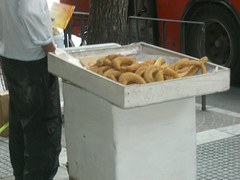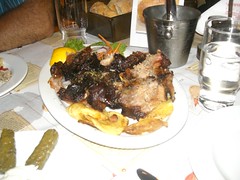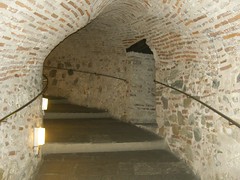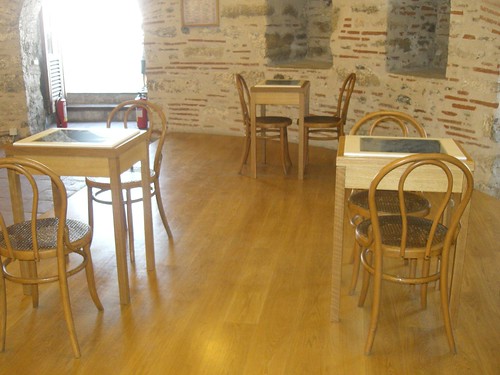Selanik, Solun, Salonicco, Salonicha, Salonique, Salonica, Sãrunã, Salonika, Saloniki, Saruna, Thess, Thessalonika. Despite having its name truncated and changed to suit the dominant cultural norms that prevailed at various points in its long history, Thessaloniki has always been Hellenic since its birth, and has always been called Thessaloniki by the Greeks. It was founded and named by King Cassander in 315 BC, Thessaloniki being the name of his wife, a half-sister of Alexander the Great (he was Greek too). Its importance stems from this time, as it became an important centre of trade with Rome, which deemed the need for an expeditious route to the city. The Ignatius Way (Via Egnatia) was created to connect Italy (where Via Appia ended) with Byzantium: it started from present-day Albania, running through the length of Modern Greece, crossing over Thessaloniki, before ending up at Constantinople in modern-day Turkey. Both Thessaloniki and Constantinople (present-day Istanbul) have always had a close connection with the Byzantine Empire, despite the fact that each city now belongs to a different country with a different religion.
Memories of former times: this sign shows the strategic importance of a city which once served at the crossroads in the link between East and West.
Thessaloniki was occupied by the Turks in 1430, who in effect ruled the city for nearly five centuries. This 'curse' gave Thessaloniki a multi-cultural advantage which it still maintains today: Thessaloniki is one of the most important cities among the Balkan states, and hosts an internationally renowned trade fair every year in September which many Eastern European countries take part in. During Turkish rule, Thessaloniki was inhabited by people who called themselves Albanians, Bulgarians, Macedonians, Romans and Greeks, whose religious affiliations ranged from Jews and Muslims to Catholics and Christian Orthodox. The Greek Army returned the city to the Hellenic state in 1912, and it's been Greek ever since. The ravages of war had a detrimental effect on its historically pluralistic nature: in the aftermath of WWII, despite being the largest Jewish city in the world for more than two centuries, there are now no more than 1,200 Jews remaining in the city, while the non-Greeks who live there are mainly migrants rather than people with any historical family links with the city.
Thessaloniki as viewed from its landmark, the White Tower: top left- looking westwards; top right- looking north; bottom- looking south into the Thermaic Gulf leaading into the Aegean.
Thessaloniki is a beautiful city, but sadly very little of the original ancient city remains; it was either destroyed by passing invaders, or burnt down in destructive fires. Nearly the whole city is relatively new, with its most important aspect being the Thermaic Gulf. The water's edge runs along the length of the city, giving it an advantage in the wider region: Thessaloniki is recognised as the capital city of the Balkan states. The multi-lingual signs in the languages of the adjacent countries attest clearly to this fact.
Immigrants form a significant part of the population of Thessaloniki. The supermarket offers come from the store window of a Russian supplier of non-Greek food products, while none of the coins and notes found in a shrine in the crypt of St Demetrius' church* (the patron saint of the city) are of Greek (euro) currency - they are all Romanian leu.
There are many sights to see in Thessaloniki, but our stay was too short to make it feasible to spend too much time at any one place. The most well-known monument in the area is the White Tower, which now functions as a historical museum of the City.
The White Tower is located by the seafront of Thesaloniki. It is now used a museum chronicling the history of the city. The top floor of the museum is not a cafe, as it may look; the coffee table tops are screens which present the visitor with a culinary journey celebrating the food of Thessaloniki, with presentations of different dishes mainly from the 'politiki kouzina' and how to prepare them.
Given our brief stay in this beautiful city, I can only give you my general impression: I have never been to a more polite part of Greece. The people are generally more soft-spoken, better dressed and more law-abiding than the South. Above all, they are very polite. When we got, let's just say, lost while driving in the city centre and ended up on the wrong side of a one-way street (which just happened to be one of the main avenues in the city centre), the man across the street who had just seen us called out: "Hey, anomale!" (The English language uses a similar word.)
"Sorry, we're not from here, see?" My husband tried to excuse himself by pointing to the licence plate of our trusty decade-old Hyundai, which clearly denotes that we are from Hania, Crete.
"Well," replied the man hopelessly, with his hands in the air. "What does it say? Did you write 'Anomale' on it?" Anywhere else I've been to in Greece, they would have called us 'malaka.'
The multi-cultural aspect of the city has also given her an advantage in the food sector: the smells and tastes of Northern Greece are richer than any other part of the country. Many of her culinary traditions are derived straight from the 'Poli' (the "City"), meaning Constantinople, and to this day, recipes originating from modern day Istanbul are referred to as 'politiki kouzina' (the cuisine of the City). Athens may be the capital of Greece, but Thessaloniki deserves the title of the food capital of the country.


The Greek version of bagel, 'koulouri', originates in Thessaloniki, while souvlaki yiro is served in a variety of forms, representing northern Greek traditions, as well as 'politiki kouzina'. For me, the different versions of pastries, more commonly known as 'bougatsa' in Thessaloniki, will remain stamped in my mind; I could never get enough of those. If I could have things my way, bougatsa would constitute my daily morning, lunch and evening meals. You can just discern the assistant cutting one with a 'bal-de' knife, something resembling a pizza cutter .

Our dining experiences in Thessaloniki never let us down. After a short rest at the hotel on our arrival, we ate in the Ladadika area at the Pans and Grills (Τηγανιές και Σχάρες)...


Meat medley cooked in parchment paper, dolmadakia, hot cheese dip, roast vegetables, ...

... kebab Thessalonikis, and loukoumades for dessert on the house...


washed down with two beers and sodas - LESS THAN 40 euro!
The next day, we decided to have a light lunch at Xatzis patisserie in the city centre...
I can't rave enough about this place, which is why I have included a large photo. Xatzis cooks up politiki kouzina creations - nearly all their recipes come from the Constantinople of former times, which is why the names of the specialites advertised on his billboards outside the shop sound very Turkish. They serve the full gamma of bougatsa, pites and Greek specialty cakes, including a dessert called Trigona Panoramatos, triangle-shaped pastries first made in the Thessaloniki suburb of Panorama by Asia Minor refugees who flooded into the city after the population exchange between Greece and Turkey in 1922. The waitress was extremely knowledgeable, and explained a host of things to us about politiki kouzina.
.

At this position, the White Tower was visible on the far side of the Thermaic Gulf - but the lights you can see on the opposite side of the harbour are the city of Katerini. The fish taverna itself was very quaint, with its family-based set-up, wooden straw mat chairs and fishing boats next to our table. We even watched a fisherman catch (and then lose) a large fish!
Thessaloniki boasts good shopping bargains (the prices here are lower in the non-brand name stores), and the people are very friendly - so we need to come back to this place, as we simply did not do it justice this time round. For more information about Thessaloniki and her food traditions, visit Peter's blog.
* St Demetrius is comemorated today - Happy Nameday to all my friends who have a Dimitri or Dimitra in their family, and most of all, to my husband!
©All Rights Reserved/Organically cooked. No part of this blog may be reproduced and/or copied by any means without prior consent from Maria Verivaki.












Xronia Polla...for Dimitri & your whole beautiful family!!
ReplyDeleteI'm so glad that you enjoyed Thessaloniki, it means you'll be back!!
Enjoy your day...celebrate!!
I loved Thessaloniki - I've spent more time in the area now than I have in any other part of Greece, except for Chania I suppose! I can't wait to go back either.
ReplyDeleteMaria, you need a good week to get a sense and feel for the city. Next time, go up to the "Kastra" or City walls for a bite.
ReplyDeleteYou've just added another place to my must go list!
ReplyDeleteYou really ought to mention that Mustapha Kemal Attaurk was born in 'Saloniki!
ReplyDeleteso right, nikos; that is another amazing fact about thessaloniki, when one considers the turn of events afterwards
ReplyDeleteIt is such fun to explre new sights, cities adn sounds Maria. Sounds like it was an adventure.
ReplyDeleteI like the idea of the touchscreen cafe, but it looks like you did a good job of sampling the food for real. The hot cheese dip and pastries look marvellous!
ReplyDeleteBest bougatsa on Egnatia St just after passing Aristotelous St on the way to Kamara named "Kozani" and "Serres". Another one is "Ariston" I think next to the former ministry of Macedonia-Thrace. "Dodoni" on Egnatia also before Aristotelous Sq coming from Vardari is considered classic but they've gone franchise lately and you must check the quality.
ReplyDeletethanks for your good advice mariza - am looking forward to trying the best bougatsa on my next trip!
ReplyDeleteA great write up and introduction to the city Maria! I also agree that bougatsa is very addictive.
ReplyDeleteLovely write up Maria. I look forward to visiting Thessaloniki and trying its delicious cuisine. Thank you for transporting me there for the time being ... kai xronia polla ston Dimitri sou!
ReplyDeleteHappy name day to your husband Maria! I love Thessaloniki and you are right: people there are polite and nice and the food gorgeous. I don't like Hadji sweets very much, because they are too sweet for me, but I was generally impressed by how many pastry shops with fantastic mouthwatering windows there are in the city!
ReplyDeleteWhat a wonderful trip - a beautiful place and SO MUCH good eating. A belated Xronia Polla to Dimitris!!
ReplyDeleteOh my God, Yugoslavia is spelled so wrong on that sign!!!!!!! So wrong!!! In every aspect...
ReplyDeleteIf i had shot that one i would put it in my "Το κουτί με τις τρελές" series of post :-D :-D :-D :-D
Good times and good food as always :-D